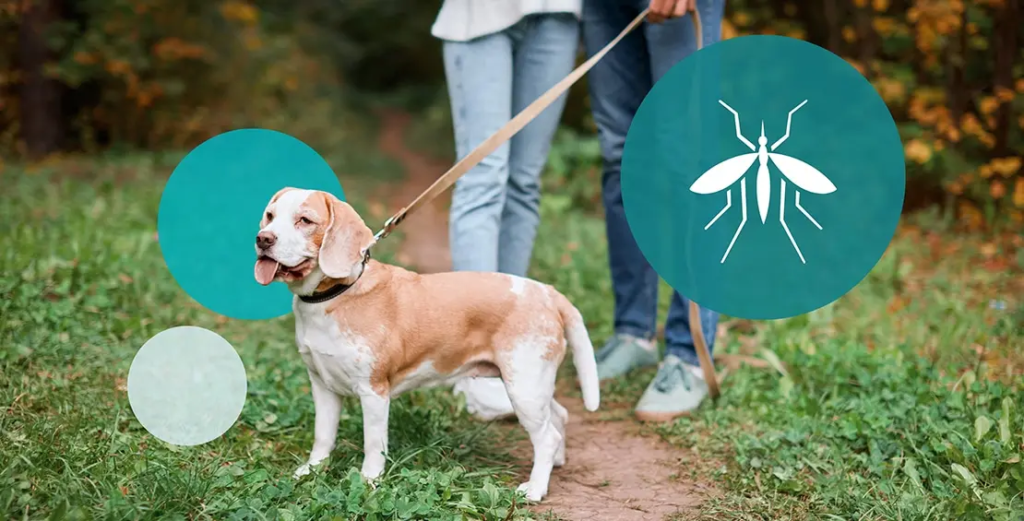Best Bug Spray for Dogs

Best Bug Spray for Dogs:- Luckily, there are plenty of all-natural, chemical-free bug sprays for dogs that effectively repel harmful insects. With so many options available, finding the perfect one for your pup can be overwhelming. But don’t worry, we’ve done the legwork for you and rounded up the top choices, so you can protect your furry friend from pests without delay.
Do Mosquitoes Bite Dogs?
Yes, mosquitoes do bite dogs. But the impact goes beyond just itchy skin. According to Dr. Gabby Pagana, an integrative veterinarian, “Mosquitoes are a major vector for several infectious diseases, including heartworm disease in dogs and West Nile Virus in humans. In fact, mosquitoes play a crucial role in the heartworm life cycle; without them, heartworm larvae wouldn’t develop.”

To keep dogs safe from mosquitoes and the diseases they carry, a two-pronged approach is essential. “Protecting both internally and externally from heartworms is crucial,” advises Dr. Hunter Finn, veterinarian and founder of Pet Method Veterinary Clinic. “I recommend internal heartworm prevention, like Heartgard, for all my clients. However, for those in heartworm hot zones or areas with high mosquito populations, using an EPA-registered mosquito repellent may also be necessary.”
A preventative can protect your pet from heartworm, but it won’t stop mosquitoes from being a nuisance to your dog. Dogs can still suffer from the itchy welts that mosquito bites leave behind. However, never use mosquito repellents made for humans on your dog. Instead, opt for pet-friendly bug sprays or repellents specifically designed for canines.
Here’s an all-natural homemade bug spray recipe for dogs that serves as a natural insect repellent. This easy-to-make solution comes together quickly, offering a safe alternative to commercial bug sprays. By using essential oils and apple cider vinegar, you can provide your furry friend with effective protection against pesky insects during the summer months.
Why Choose Natural Bug Repellents for Your Dog?
Best Bug Spray for Dogs:- Our pets deserve the very best, especially when it comes to safeguarding them from serious diseases like West Nile virus and Lyme disease. Depending on where you live, mosquitoes, ticks, and other biting insects may be a frequent concern.
While it’s essential to protect our furry friends, we also need to be mindful of the chemicals we expose them to. Dogs have different sensitivities compared to humans, and certain substances, including some found in food, herbs, and everyday products, can be harmful to them. Natural bug repellents offer a safer alternative, helping you protect your dog without compromising their health.
The good news is that there are plenty of natural alternatives to conventional insect repellents. One effective option is making your homemade dog bug spray. Plants like citronella, lavender, and geranium not only enhance your landscaping but also serve as natural deterrents to pesky bugs. You can also incorporate neem oil in your spray, though it does have a strong odor that some may find unpleasant—but it’s quite effective!
If you live in an area where mosquito-borne diseases are a concern, consider additional organic products for extra protection. However, avoid any product containing DEET or Picaridin, as these ingredients can be harmful to your pet, leading to issues like vomiting, skin irritation, staggering, or even seizures.

What to Consider When Choosing Mosquito Repellents for Dogs
How to Choose Best Bug Spray for Dogs:- Not all insect repellents are created equal, and they may not all be suitable for your dog’s specific needs. Every dog is unique, so what works well for one might not be effective for another. That’s why it’s essential to do your research before applying any product to your pet—to avoid causing harm and to save time and money. To ensure you select the right mosquito repellent for your dog, consider the following factors and choose accordingly.

Application Methods
There are numerous mosquito protection options available, and the ease of application and duration of effectiveness vary depending on the type you choose. The most common mosquito repellents, categorized by their application methods, include:
– Sprays
– Topical spot-on treatments
– Insect-repelling collars
– Insect-repellent clothing
– Shampoos
– Powders
– Wipes
It’s up to you to choose the option that best suits your needs. For example, if your pet enjoys swimming or if you want to enhance the repellent’s effectiveness in certain situations, like before heading outdoors, sprays or wipes might be your best bet. On the other hand, if you’re looking for something with long-lasting protection, spot-on repellents could be the way to go. Keep in mind that the longevity and potency of repellents can vary by type, so it’s crucial to check the active ingredients rather than assuming one is automatically more effective than another.
What should you do if your dog licks bug spray off your skin?
Generally, if your pet licks a small amount of bug spray, they might experience mild symptoms like drooling or nausea, but these usually resolve on their own. “If your dog starts drooling or vomits, it’s typically not serious as long as the symptoms pass quickly,” LaRock explained.
However, if your dog licks a large area or if you have a smaller breed, it’s a good idea to rinse their mouth with water and keep an eye out for stomach upset for the next two to four hours, according to Dr. Burke. If you notice severe symptoms, contact your veterinarian. In most cases, a single lick won’t result in a toxic dose, but it’s wise to prevent your dog from licking bug spray in the future.
Also Read:-




